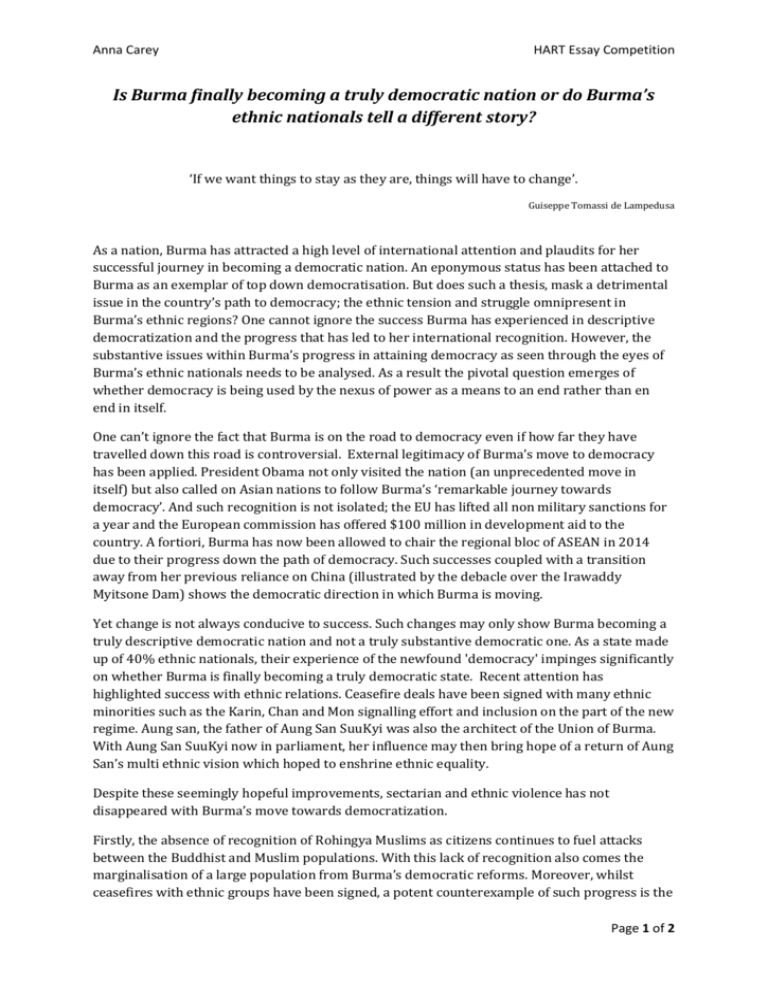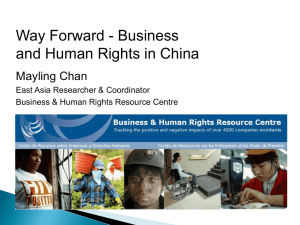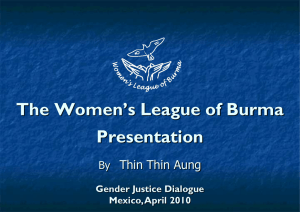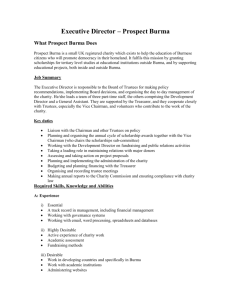`Is Burma finally becoming a truly democratic nation or do Burma`s
advertisement

Anna Carey HART Essay Competition Is Burma finally becoming a truly democratic nation or do Burma’s ethnic nationals tell a different story? ‘If we want things to stay as they are, things will have to change’. Guiseppe Tomassi de Lampedusa As a nation, Burma has attracted a high level of international attention and plaudits for her successful journey in becoming a democratic nation. An eponymous status has been attached to Burma as an exemplar of top down democratisation. But does such a thesis, mask a detrimental issue in the country’s path to democracy; the ethnic tension and struggle omnipresent in Burma’s ethnic regions? One cannot ignore the success Burma has experienced in descriptive democratization and the progress that has led to her international recognition. However, the substantive issues within Burma’s progress in attaining democracy as seen through the eyes of Burma’s ethnic nationals needs to be analysed. As a result the pivotal question emerges of whether democracy is being used by the nexus of power as a means to an end rather than en end in itself. One can’t ignore the fact that Burma is on the road to democracy even if how far they have travelled down this road is controversial. External legitimacy of Burma’s move to democracy has been applied. President Obama not only visited the nation (an unprecedented move in itself) but also called on Asian nations to follow Burma’s ‘remarkable journey towards democracy’. And such recognition is not isolated; the EU has lifted all non military sanctions for a year and the European commission has offered $100 million in development aid to the country. A fortiori, Burma has now been allowed to chair the regional bloc of ASEAN in 2014 due to their progress down the path of democracy. Such successes coupled with a transition away from her previous reliance on China (illustrated by the debacle over the Irawaddy Myitsone Dam) shows the democratic direction in which Burma is moving. Yet change is not always conducive to success. Such changes may only show Burma becoming a truly descriptive democratic nation and not a truly substantive democratic one. As a state made up of 40% ethnic nationals, their experience of the newfound 'democracy' impinges significantly on whether Burma is finally becoming a truly democratic state. Recent attention has highlighted success with ethnic relations. Ceasefire deals have been signed with many ethnic minorities such as the Karin, Chan and Mon signalling effort and inclusion on the part of the new regime. Aung san, the father of Aung San SuuKyi was also the architect of the Union of Burma. With Aung San SuuKyi now in parliament, her influence may then bring hope of a return of Aung San’s multi ethnic vision which hoped to enshrine ethnic equality. Despite these seemingly hopeful improvements, sectarian and ethnic violence has not disappeared with Burma’s move towards democratization. Firstly, the absence of recognition of Rohingya Muslims as citizens continues to fuel attacks between the Buddhist and Muslim populations. With this lack of recognition also comes the marginalisation of a large population from Burma’s democratic reforms. Moreover, whilst ceasefires with ethnic groups have been signed, a potent counterexample of such progress is the Page 1 of 2 Anna Carey HART Essay Competition end of the ceasefire with the Kachin Independence Army. Similar attacks have also been seen; in 2009 Burmese army attacked the ethnic Kokang group and in 2010 the army attacked the Myawaddy town in Karen state. Ceasefires can also be seen as insufficient pause buttons, rather than the necessary stop buttons as without addressing the root causes of conflict, ethnic nationals are being muted rather than being brought into the boundaries of democracy.Whilst it seems that an olive branch is being held in one hand, weapons of mass destruction are being held in the other.Such violence, isolation and disregard of specific ethnic nationals bring the government’s commitment to democracy and what it entails into question. Meanwhile, the Tatmadaw still holds supremacy on the 'civilian led' government.The military isn't accountable to anyone and almost all ministers in the new government were ministers in the old government. As such, ethnic parties have no autonomy or tools with which to instigate power on their government.The Tatmadaw's underpinning of 'One blood, one voice, one command' is still running through the veins of government. Aung San SuuKyi speculated she's "always tried to explain democracy is not perfect. But it gives you a chance to shape your own destiny". With ethnic nationals not being able to express their own destiny they do provide an alternative story to Burma becoming a truly democratic state. Nevertheless to conclude that Burma’s path to a truly democratic nation is hinged solely on the story of Burma’s national ethnics narrows the remit of democracy and conceals similarly troubling concerns for Burma’s democracy. Forced labour, child soldiers and political prisoners illustrate some of the nation’s problems.For a microcosm of Burma’s struggles consider the recent peaceful anti copper mine protests in Monywa Sagaing and the Burmese exercising their human right to peaceful assembly being met with the security forces using of tear gas, smoke bombs and even white phosphorus grenades. The hindrances to a truly democratic nation are clearly multifaceted. So whilst ethnic nationals show that Burma is not a truly democratic nation, they are not the only source casting doubt on this. What emerges is that further inclusion of Burma’s ethnic nationals in the political process and democracy is necessary. To fully engage with democracy, Burma must fully engage with all of her citizens and simultaneously fully disengage with the Tatmadaw’s stranglehold on Burma’s politics. Whilst Burma’s ethnic nationals cast doubt on the strength of democracy, this shouldn’t conceal Burma’s other pressing problems or, discredit democratic political reform. Mirroring Tomas Ojea Quintana’s recent visit and consequent concerns, the question persists whether Burma is currently on a one Way Street to democracy or a U turn remains a possibility. The conclusion hinges on how Burma uses its truly democratic opportunity. It is only then that it will be possible to see if Lampedusa’s postulation that ‘If we want things to stay as they are, things will have to change’ holds true for Burma. Page 2 of 2








